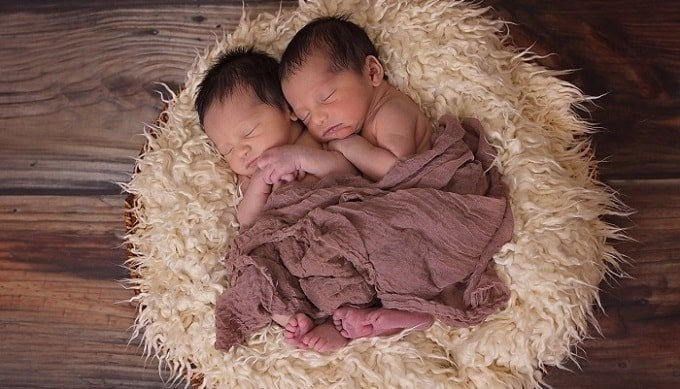
A single-child pregnancy is an emotional rollercoaster: there will be days of absolute delight and excitement coupled with moments of discomfort. And it’s a cycle that will last for nine months.
What if there are two people inside the womb? Is the experience any different? Do the discomforts remain the same or are they elevated?
Read on to know the signs and symptoms of multiple pregnancies; how to have a more comfortable nine months; and what else can be expected when carrying twins.
Signs & Symptoms of a Twin Pregnancy
You cannot tell from the get-go whether your pregnancy will result in multiple births or not. There are signs, like rapid weight gain, but that alone isn’t a clear enough indicator of twin pregnancy.
An ultrasound is still the most accurate way to detect the presence of more than one child in the womb. One taken at around five or six weeks of pregnancy can tell whether or not you are carrying twins.
However, there are signs that can point to a possible twin pregnancy:
Elevated levels of hCG
The human chorionic gonadotropin (hCG) hormone is produced during pregnancy. Blood and urine tests can measure hCG levels and a result that is higher than normal can indicate a twin pregnancy.
Severe nausea
While it’s true that many of those who carried twins experienced intense morning sickness, the condition is not exclusive. Many women who have had single births also experienced severe nausea throughout their pregnancy.
Bigger uterine size
This is measured at around 16 weeks of pregnancy or even later. The fundal height, the distance between pubic bone’s top to the uterus’ top, is monitored to determine gestational age.
A woman carrying more than one child often have larger than expected uterine size, but it isn’t a definite guarantee as other factors may have caused the increase.
Increased weight gain
It is normal for pregnant women to gain weight during pregnancy, but a rapid increase is seen by some as an indication of multiple births. This isn’t necessarily the case as doctors offer suggestions as to how much weight to gain depending on body type, height, and pre-pregnancy weight.
What to Expect When Carrying Twins
There is a higher chance of conceiving twins if you are in your 30s and 40s. Although getting pregnant around that age might be more difficult, it increases the likelihood of multiple births.
Why does it happen? The ovulation cycles around that age aren’t as regular anymore. So there’s a chance that you could be ovulating two follicles at once.
And if you’re already pregnant and anticipating the birth of your children, here are some things to expect:
You might need extra folic acid
Carrying multiples means a high-risk pregnancy. Although serious complications are not the norm, some issues like premature birth are common when carrying twins.
One baby may also be lost in a twin pregnancy, but it doesn’t affect the other fetus when it happens during the first trimester.
Folic acid is taken to reduce the chances of miscarriage. In addition, it can also lessen the risk of neural tube birth defects, including spina bifida.
You will need to go to the doctor more often
Multiple pregnancies are high risk. As an expectant mother of twins, your pregnancy should be monitored more closely to ensure that any complications are spotted as early as possible.
You might experience severe morning sickness
As referenced earlier, many of those who birthed multiple children experienced intense nausea during their pregnancy. Morning sickness is linked to high levels of hCG, which is higher in twin pregnancies.
Pregnant women have high levels of hCG and as such, it is more likely for nausea and vomiting to happen during the first trimester. But just like single pregnancies, the symptom goes away within 12 to 14 weeks.
You will experience increased discomfort
A single pregnancy can bring with it a number of discomforts for each woman. But carrying two means a couple of the issues brought to a different level.
Many women who delivered multiples complained more about back pain, heartburn, and sleeping difficulties compared to those who birthed one child.
You will find spotting more common
A bit of spotting is always a cause for concern, even in single pregnancies. The appearance of a spot of blood could mean a miscarriage.
Given that miscarriages are quite high with mothers carrying multiples, it is more common to see spotting during the first trimester. However, mothers can rest a bit easy if the bleeding is not accompanied by cramps.
Active bleeding coupled with passing clots and active bleeding are signs of something wrong and medical advice should be sought immediately.
You might gain more weight
It is normal for mothers carrying twins to gain more weight given there are two children in the womb, two placentas, and more amniotic fluid. Plus, mothers need more calories when carrying twins.
Weight gain is recommended for mothers pregnant with multiples, but there isn’t a clear rule as to how much weight should be put on. Although around 30-35 is the recommended amount, it’s still best to consult with a healthcare provider.
You run the risk of developing gestational diabetes
Gestational diabetes is caused by a change in the body’s reaction to insulin, a hormone that moves glucose from the blood into the cells so it can be used for energy by the body.
Cells are more resistance to insulin during pregnancy leading to an increase of sugar in the blood. As a result, more nutrients can be delivered to the babies.
A spike in glucose can spell trouble for you and your unborn children. Developing gestational diabetes during pregnancy puts you at risk for:
- high blood pressure
- preeclampsia
- preterm birth
- stillbirth
Your unborn children are also at risk of breathing problems, jaundice, low glucose levels, obesity during childhood, and also the risk of developing diabetes later in life.
Multiple Pregnancy Tips
While carrying multiples requires more doctor’s appointments and care, the general advice is more or less the same with being pregnant with just one child. Essentially, the guidelines are to:
Eat well
There’s a certain misconception that being pregnant with twins means having to eat more. While it is important to gain weight during pregnancy, it is equally important to do so while eating a healthy diet.
A healthy diet should consist of lots of fruit, vegetables, and whole grains; these are food sources that keep constipation at bay. In addition, they also provide much-needed vitamins and minerals.
Protein is also an important part of the diet so include lean red meat, nuts, seeds, and well-cooked eggs into your diet. Your calcium needs can be taken from dairy sources such as cheese, milk, and yogurt.
It’s unavoidable to want to snack but it’s best to consume the healthy variety. This means opting for low-fat yogurt, fresh fruit, or sandwiches with lean ham, mashed tuna, or grated cheese.
Stay active
Walking is one of the simplest forms of exercise that you can do. Performing light activities helps prevent aches and pains.
Other possible activities include antenatal yoga, pilates, tai chi, and swimming.
Expecting to deliver twins is exciting but it will also involve months of discomfort. But knowing what to expect and what can be done can make the journey flow more smoothly.



